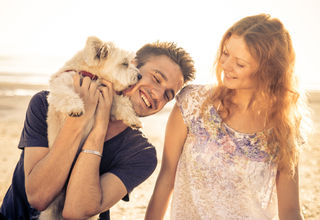Mating
How Dogs Help Men in the Dating Market
Research shows that dog ownership has a remarkable effect.
Posted April 20, 2016

When you take your dog for a walk, do you find yourself chatting with attractive strangers more often than when you walk by yourself? Has your dog ever helped you start a relationship? If so, you're not alone. Research suggests that man's best friend may also be his best wingman.
One of the first studies to document the potential relationship benefits of dog ownership took place in France (Guéguen & Ciccotti, 2008). A 20-year old male research confederate, who was chosen for being physically attractive, was trained to carry out two versions of a study. In both versions, he approached women in a pedestrian-friendly urban area, complimented them, and asked for their phone numbers. For 120 of these interactions, he approached the women alone; for the other 120, he approached the women while he was walking a dog. The confederate was trained to interact in the same way in both versions of the study; the only difference being the presence or absence of the dog.
As a general rule, asking women for their phone numbers without any real interaction preceding such a request doesn't yield a lot of positive responses. That said, the confederate had much more success when he was walking the dog. The percentage of women who agreed to his request jumped from 9.2 percent to 28.3 percent when the dog was present.
That's a substantial difference.
So why do dogs help men in the dating market?
A recent lab experiment in Israel pursued this question (Tifferet, Kruger, Bar-Lev, & Zeller, 2013). Women, it turns out, perceive men who are walking dogs more favorably than they do men who aren't walking dogs. Women see dog-walking men as having more long-term romantic potential (as well as short-term potential) than the same men who aren't walking dogs.
Why is this?
The researchers suggest that when you're walking a dog, people often assume you're the owner of that dog—i.e., that you're able to make the sacrifices necessary to take good care of a dog. If that's so, you might make a fantastic boyfriend or husband. People might infer that a dog-walking man knows how to form lasting attachments, has the resources to care for someone else (dog ownership is expensive!), and is reliable enough to do the daily work involved with dog ownership. In other words, the dog may signal a set of underlying characteristics that are highly desirable in a long-term romantic partner.
This means that dogs could be used as a strategic tool to attract a partner. If walking a dog is suggestive of desirable long-term characteristics, individuals who have a short-term relationship view might be able to shift the perception of themselves to appeal to attractive women who are not interested in short-term affairs. In fact, men with a "dad" vibe didn't benefit from walking a dog, but women judged "cads" (i.e., socially-dominant men who like short-term relationships) as much more attractive partners when they had dogs.
This research sparks some interesting questions: The evidence clearly suggests that dog ownership, or just walking a friend's dog, could improve a single heterosexual man's chances of connecting with a desirable woman.* But would this also apply to gay men? And are women who walk dogs perceived differently than women who do not? Further, does it matter what kind of dog you walk? Does walking a Chihuahua lead to different inferences as compared to walking a German Shepherd?
One last thought: What about other pets? How does the ownership of cats, birds, or even snakes influence perceptions related to romantic attraction? What ideas are formed, for example, from online dating profiles that mention pet ownership?
* This might be a good fact to file away if you're ever trying to convince a single, heterosexual male friend to take care of your dog when you're away.
Reference
Guéguen, N., & Ciccotti, S. (2008). Domestic dogs as facilitators in social interaction: An evaluation of helping and courtship behaviors. Anthrozoös, 21(4), 339-349.
Tifferet, S., Kruger, D. J., Bar-Lev, O., & Zeller, S. (2013). Dog ownership increases attractiveness and attenuates perceptions of short-term mating strategy in cad-like men. Journal of Evolutionary Psychology, 11(3), 121-129.


